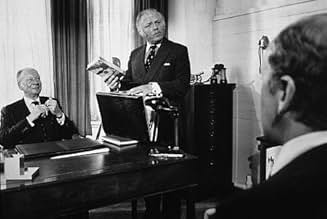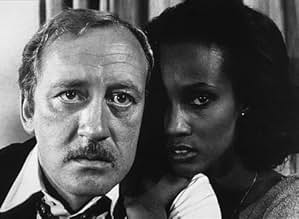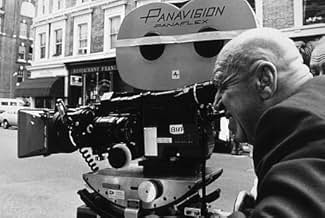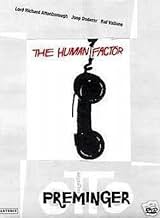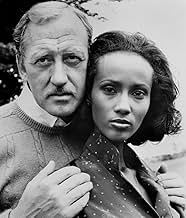NOTE IMDb
6,1/10
1,7 k
MA NOTE
Lorsque l'on découvre que des informations ont fuité dans le service de renseignements britanniques aux affaires africaines, Daintry, agent de la sécurité, est amené à enquêter.Lorsque l'on découvre que des informations ont fuité dans le service de renseignements britanniques aux affaires africaines, Daintry, agent de la sécurité, est amené à enquêter.Lorsque l'on découvre que des informations ont fuité dans le service de renseignements britanniques aux affaires africaines, Daintry, agent de la sécurité, est amené à enquêter.
- Réalisation
- Scénario
- Casting principal
Avis à la une
Maurice Castle (Nicol Williamson) is a bland mid-level bureaucrat in British intelligence. The only notable fact about him is his African wife Sarah (Iman). His superiors suspect a leak in the firm and decide to quietly eliminate the mole to avoid any publicity. Castle's office mate Arthur Davis (Derek Jacobi) becomes the main target of investigation.
Otto Preminger directs this realistic espionage thriller from a Graham Greene novel with many veteran British actors. With such great pedigree, I expected a great classic but this is definitely second tier level. It does get better in the second half. The first half is a slow slough. Maurice's blandness works against the film during that first half. In fact, he's a side character in his own movie. The production value is limited. This looks more like a TV movie. Preminger is really struggling even considering the budget. The filming is not imaginative and very static. It's almost a throwback to the early black and white movies. The only salvation is the Graham Greene writing which has a sense of realism which is very intriguing. This is a little disappointing.
Otto Preminger directs this realistic espionage thriller from a Graham Greene novel with many veteran British actors. With such great pedigree, I expected a great classic but this is definitely second tier level. It does get better in the second half. The first half is a slow slough. Maurice's blandness works against the film during that first half. In fact, he's a side character in his own movie. The production value is limited. This looks more like a TV movie. Preminger is really struggling even considering the budget. The filming is not imaginative and very static. It's almost a throwback to the early black and white movies. The only salvation is the Graham Greene writing which has a sense of realism which is very intriguing. This is a little disappointing.
Nicol Williamson remains restrained throughout the film, yet his face is so expressive that it does mirror the emotions and thoughts of his character. His admirable performance elevates this otherwise flat, talky thriller, which definitely tries to be a non-taditional spy drama, in the spirit of "The Ipcress File", but doesn't even have the elementary excitement we expect from the genre. (**)
After I had read this late Graham Greene novel years ago, I was immediately fascinated by its le Carré-like plot with very much Greene-like characters. I immediately thought that this should have been made into a movie.
Shortly afterwards, I learnt that Preminger had already made it into a film back in 1979, so I was of course very eager to see this movie. Yet - this film has fallen into oblivion, it is not commercially available and it is hardly ever on TV.
Very strange if you consider that it features a cast bristling with splendid British character actors (Nicol Williamson, Derek Jacobi, Robert Morley, Richard Attenborough, to name but a few) and has a screenplay by Tom Stoppard (which IMHO was a straightforward, enjoyable transfer of Greene's novel to the screen).
So, only yesterday did I have the opportunity to watch it on TV. Certainly, it is no cinematographic highlight: it is very low-key, very unfussily directed by Otto Preminger in a more than plain style, and has basically no "action" (but then - what would you expect of a Greene novel?). It might as well have been made for TV, but this impression may also be due to the serious budget problems while filming.
However, it has some splendid performances by actors whom I could watch all day long. The mere cast turns this film into a success and makes it worthwhile watching.
Shortly afterwards, I learnt that Preminger had already made it into a film back in 1979, so I was of course very eager to see this movie. Yet - this film has fallen into oblivion, it is not commercially available and it is hardly ever on TV.
Very strange if you consider that it features a cast bristling with splendid British character actors (Nicol Williamson, Derek Jacobi, Robert Morley, Richard Attenborough, to name but a few) and has a screenplay by Tom Stoppard (which IMHO was a straightforward, enjoyable transfer of Greene's novel to the screen).
So, only yesterday did I have the opportunity to watch it on TV. Certainly, it is no cinematographic highlight: it is very low-key, very unfussily directed by Otto Preminger in a more than plain style, and has basically no "action" (but then - what would you expect of a Greene novel?). It might as well have been made for TV, but this impression may also be due to the serious budget problems while filming.
However, it has some splendid performances by actors whom I could watch all day long. The mere cast turns this film into a success and makes it worthwhile watching.
'Sr Moreno' dismisses the Preminger film adaptation of 'The human factor' very intemperately: The clincher of his argument - which consists largely in being rude to Iman (she was perfectly adequate in her role, and certainly believably a beauty whom a career diplomat might have risked his career for) - is Graham Greene's own declared dislike of Preminger's version.
While obviously his own direct collaboration with Carol Reed made 'The Third Man' into the definitive Greene adaptation for the screen, and a classic sans pareil, there is still no need to be unduly respectful of his impatience with this version of his 'The human factor.'
After all, Greene had a well-known falling-out with Mankiewicz during the filming of the 1959 version of 'The quiet American,' but no-one else thinks that was a bad movie!
Few filmed adaptations are entirely successful - probably without the original author's close collaboration they will inevitably be more-or-less diminished versions of the literary form. And while Grahame Greene was perfectly entitled, with the status of 'onelie true begetter' to be hyper-critical of any lesser recensions, that is not a sensible reason for the rest of us not to enjoy and appreciate what is a perfectly intelligent and involving film in its own right.
There are few enough thrillers around on the TV today which do not involve various forms of adolescent excitability and excess that I should have thought the BBC were perfectly justified in giving it an airing recently on their 'thoughtful' channel.
This is no 'The third man' to be sure - but then, what is? This remains a film with, clearly, much in it to admire.
Surely, if every film has to achieve the status of 'masterpiece' before it can be accepted at all - as 'Moreno' appears to believe - then would there not be a certain danger of an unbridgeable culture-gap developing between the extremes of 'art-house film' and 'teen-flick'? Fortunately, audiences - and film-makers - are still quite willing to 'give it a go,' even if the results are 'merely' intelligent, rather than the absolutely brilliant - and still quite rare - product of genius!
Really, I feel most strongly that 'Moreno''s strictures represent exactly the kind of intellectual snobbery which can only tend to alienate cinema audiences even further from any more sober and challenging films.
There really are enough points of worthwhile discussion raised by this film of 'The human factor' for it to be impossible to dismiss in a single paragraph of supercilious contempt: 'Terrible' does not amount to a review, but only to intemperate spleen, I'm afraid.
While obviously his own direct collaboration with Carol Reed made 'The Third Man' into the definitive Greene adaptation for the screen, and a classic sans pareil, there is still no need to be unduly respectful of his impatience with this version of his 'The human factor.'
After all, Greene had a well-known falling-out with Mankiewicz during the filming of the 1959 version of 'The quiet American,' but no-one else thinks that was a bad movie!
Few filmed adaptations are entirely successful - probably without the original author's close collaboration they will inevitably be more-or-less diminished versions of the literary form. And while Grahame Greene was perfectly entitled, with the status of 'onelie true begetter' to be hyper-critical of any lesser recensions, that is not a sensible reason for the rest of us not to enjoy and appreciate what is a perfectly intelligent and involving film in its own right.
There are few enough thrillers around on the TV today which do not involve various forms of adolescent excitability and excess that I should have thought the BBC were perfectly justified in giving it an airing recently on their 'thoughtful' channel.
This is no 'The third man' to be sure - but then, what is? This remains a film with, clearly, much in it to admire.
Surely, if every film has to achieve the status of 'masterpiece' before it can be accepted at all - as 'Moreno' appears to believe - then would there not be a certain danger of an unbridgeable culture-gap developing between the extremes of 'art-house film' and 'teen-flick'? Fortunately, audiences - and film-makers - are still quite willing to 'give it a go,' even if the results are 'merely' intelligent, rather than the absolutely brilliant - and still quite rare - product of genius!
Really, I feel most strongly that 'Moreno''s strictures represent exactly the kind of intellectual snobbery which can only tend to alienate cinema audiences even further from any more sober and challenging films.
There really are enough points of worthwhile discussion raised by this film of 'The human factor' for it to be impossible to dismiss in a single paragraph of supercilious contempt: 'Terrible' does not amount to a review, but only to intemperate spleen, I'm afraid.
I must confess that this was the first Otto Preminger movie I've seen, so I cannot comment it as an Otto Preminger movie, but rather just a movie among others.
I'm very much a fan of both cold war spy movies and 70/80s Great Britain, so the elements were in place for me to enjoy this. I had never heard of this (I'm yet to go through Preminger's movies) and I quite randomly picked it from the online service as it seemed pretty interesting.
And it was interesting. Very subtle and talkative, I have to say I really really liked it. The story itself wasn't too exciting, but interesting nonetheless. It's about the secret service and an apparent leak of information - possibility of double agents and so on. Very gripping, yet quite slow paced - no action. I just watched le Carre film "The Spy Who Came in from the Cold" and they are quite alike in style, altho I have to say I enjoyed this more. Even if it's not necessarily as well made, this wasn't quite as heavy-handed.
The acting is great for the most part. Nicol Williamson was a name I hadn't heard of before, but his presence really made this movie. Very understated and brilliant character, just like anyones neighbor or work colleague. There's a weak link too unfortunately and that's Iman, she's horribly wooden and unnatural in her acting most of the time.
I'm dropping one point because of sloppy cinematography too - lighting in particular and a few shots that look really staged. I'm not sure why some scenes were so horribly set up, the lights almost looked as if they just flipped a few spotlights over and pointed them at actors faces.
Despite these few flaws, it's a really enjoyable spy movie for anyone into cold war spy stories in style of le Carre etc. Grab a whisky and time machine yourself back into cold war era. This doesn't seem to be too well distributed tho so it may be a bit hard to find.
I'm very much a fan of both cold war spy movies and 70/80s Great Britain, so the elements were in place for me to enjoy this. I had never heard of this (I'm yet to go through Preminger's movies) and I quite randomly picked it from the online service as it seemed pretty interesting.
And it was interesting. Very subtle and talkative, I have to say I really really liked it. The story itself wasn't too exciting, but interesting nonetheless. It's about the secret service and an apparent leak of information - possibility of double agents and so on. Very gripping, yet quite slow paced - no action. I just watched le Carre film "The Spy Who Came in from the Cold" and they are quite alike in style, altho I have to say I enjoyed this more. Even if it's not necessarily as well made, this wasn't quite as heavy-handed.
The acting is great for the most part. Nicol Williamson was a name I hadn't heard of before, but his presence really made this movie. Very understated and brilliant character, just like anyones neighbor or work colleague. There's a weak link too unfortunately and that's Iman, she's horribly wooden and unnatural in her acting most of the time.
I'm dropping one point because of sloppy cinematography too - lighting in particular and a few shots that look really staged. I'm not sure why some scenes were so horribly set up, the lights almost looked as if they just flipped a few spotlights over and pointed them at actors faces.
Despite these few flaws, it's a really enjoyable spy movie for anyone into cold war spy stories in style of le Carre etc. Grab a whisky and time machine yourself back into cold war era. This doesn't seem to be too well distributed tho so it may be a bit hard to find.
Le saviez-vous
- AnecdotesAuthor Graham Greene said of his novel "The Human Factor" in his 1980 autobiography "Ways of Escape" that it was "to write a novel of espionage free from the conventional violence, which has not, in spite of James Bond, been a feature of the British Secret Service. I wanted to present the Service unromantically as a way of life, men going daily to their offices to earn their pensions."
- GaffesIn the South African scenes (filmed in Kenya), the cars have Kenyan registration plates.
- Citations
Maurice Castle: [referring to Davis] He calls all children "little bastards".
Meilleurs choix
Connectez-vous pour évaluer et suivre la liste de favoris afin de recevoir des recommandations personnalisées
- How long is The Human Factor?Alimenté par Alexa
Détails
- Date de sortie
- Pays d’origine
- Sites officiels
- Langue
- Aussi connu sous le nom de
- The Human Factor
- Lieux de tournage
- Sociétés de production
- Voir plus de crédits d'entreprise sur IMDbPro
Box-office
- Budget
- 5 500 000 $US (estimé)
- Montant brut aux États-Unis et au Canada
- 376 050 $US
- Montant brut mondial
- 376 050 $US
Contribuer à cette page
Suggérer une modification ou ajouter du contenu manquant


